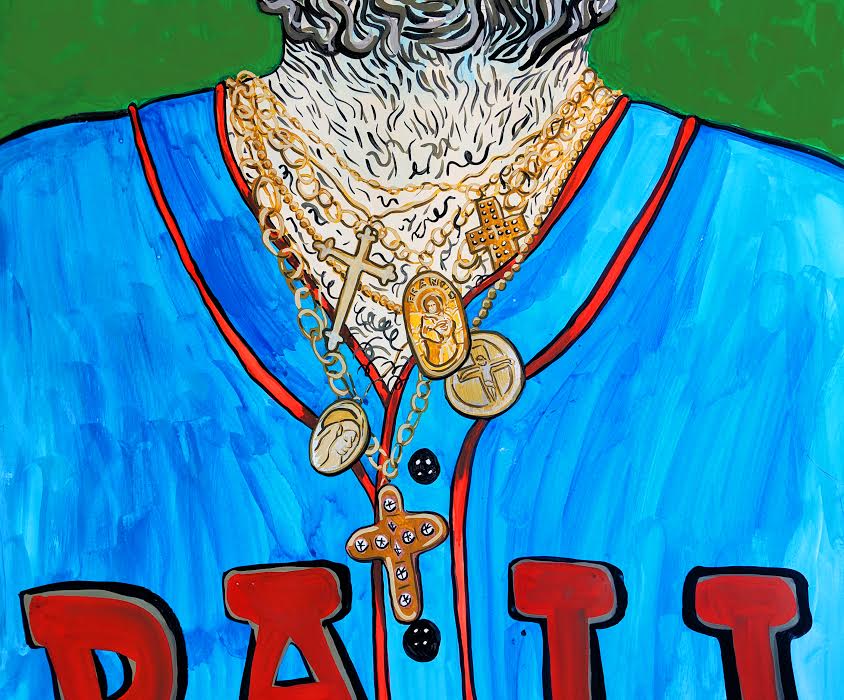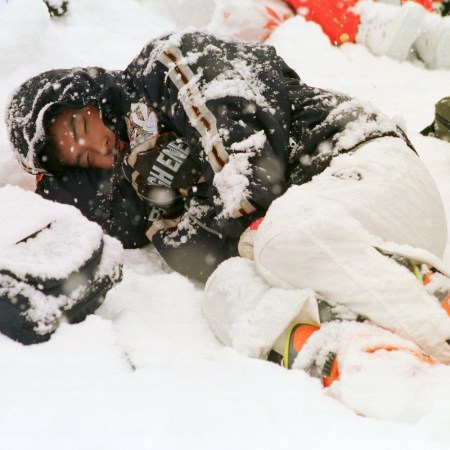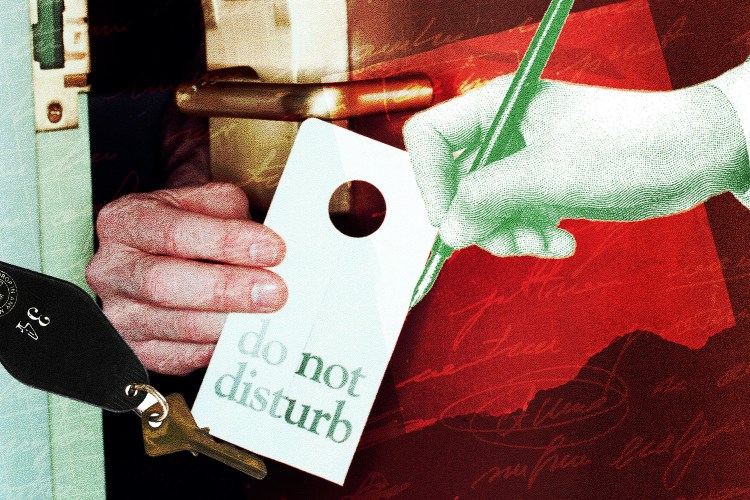The skies are partly cloudy and temperatures comfortably in the 70s as the sun sets on Gallatin, Tennessee, on a Monday evening in late April. In other words, perfect baseball weather.
Accordingly, Brent High is doing what he does most often on nights like this: watching kids play, in this case the local Lipscomb Academy middle-grade squad. High is an alumnus of the private, Christian institution and even used to call play-by-play for the team’s games, in addition to driving the creation of Lipscomb’s Fellowship of Christian Athletes chapter 22 years ago. And he has never wavered in his belief that sports and spirituality soar on the same plane. It’s a mindset that also makes him uniquely qualified to assess whether the culture and doctrine of Christianity has become increasingly influential in American baseball, including at the major-league level.
“I think the last five years, maybe going back 10, a lot of the most successful on-the-field athletes have been outspoken [about their Christian faith],” High observes. “It’s almost become not only comfortable, but maybe even encouraged for the guys that do have the platform to use it.”
High might have a little something to do with that. The Nashville native and father of two is reasonably famous in his own backyard and beyond as a co-founder of Third Coast Sports, which aims to spread the message of Christ by partnering with sports teams and entertainers and staging popular Faith Night events at Major League Baseball venues.
“For a guy like me, who does have the heart for it, in addition to understanding the business side, that’s a double win,” he exclaims of any symbiosis between MLB and the Christian church. “Not only do I have a happy team and happy sponsors, but the ministry side of why we exist is being activated when guys like Charlie Blackmon for the Colorado Rockies gets up there and boldly proclaims his faith right after he’s gone 3-4 in the game with a homer and a double.”
Starting in the mid-2000s, Third Coast began partnering with MLB clubs including the Rockies, Atlanta Braves and Washington Nationals on what would grow into Faith Nights. They were essentially a scaling up of grassroots promotions High conceived of while serving as VP of Sales for Milwaukee Brewers AAA affiliate Nashville Sounds between 2003-’05. The events — typically occurring inside a team’s stadium after the conclusion of a game — are equal parts outdoor megachurch service (often featuring testimony from home-team players, such as the aforementioned Blackmon, along with John Smoltz and Lance Berkman, to name a few) and Christian rock concert. And they have translated to big business over the past decade-plus for MLB.
“You’ve gotta put yourself in the shoes of these executives at these teams we partner with,” says High. “They care about one thing: butts in the seats. If they can have realtor night, scout night, little-league night — if it can move ticket sales, they’ll host it.”
Third Coast and MLB’s partnership is an emphatic confirmation of what High describes: that Major League Baseball, more than any other major American professional sport, has mirrored the mainstreaming of evangelical Christian influence in particular on our culture at large. (High prefers to eschew labels, saying he simply follows “The Way.”)
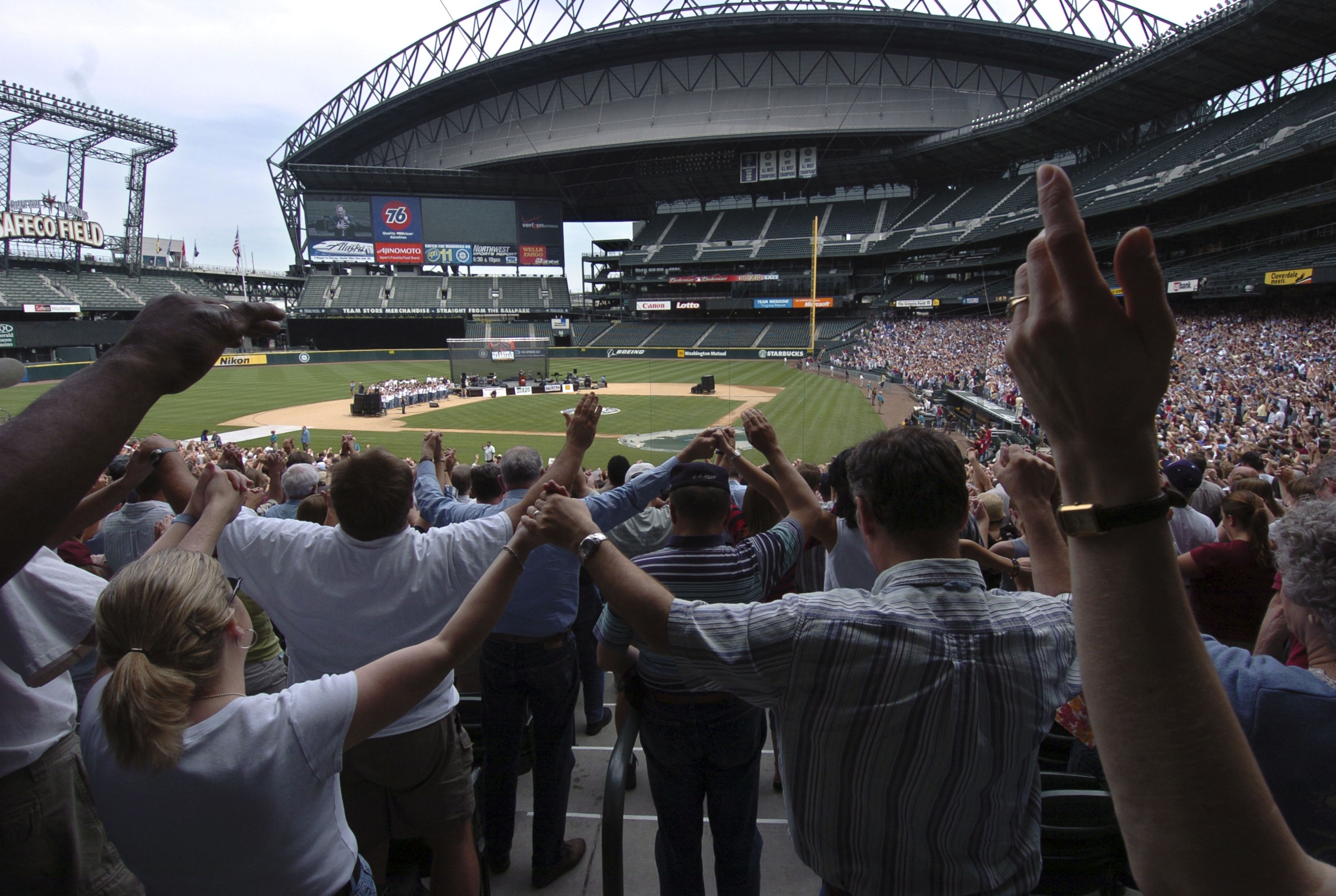
Throughout MLB’s 150-year history, there have been stars who practiced the gospel as religiously as their on-field fundamentals. New York Giants legend Christy Mathewson is still hailed among the similarly pious as “The Christian Gentleman.” Longtime Dominican-born player/manager Felipe Alou (whose brothers, Matty and Jesús, and son, Moises, were also successful major-leaguers) famously converted from Catholicism to an evangelical strain of Christianity. And the list goes on. But none of them had social media.
That’s why in early 2018, Eastern Illinois University Political Science professor Dr. Ryan P. Burge conducted an analysis of players’ Twitter accounts across MLB, the NBA and NFL, finding that nearly eight percent of subscribed MLB players referenced a New Testament passage in their bio, fully double the percentage of NFL players and more than sevenfold that of NBAers. And that eight percent (a number that increases when expanding to broader allusions to Christ himself) isn’t exactly a compilation of mid-level roster guys with nothing to lose by laying their faith on the line. Perennial All-Stars and bright-up-and-comers alike ranging from Clayton Kershaw, Adam Wainwright and Matt Carpenter to Trevor Story, Ben Zobrist, Scooter Gennett and Steven Matz all ostensibly use their public platform to evangelize. Which is their want and Constitutional (some might say God-given) right. But is this marriage of missions — winning and wooing potential religious converts — anathema to the wider, secular appeal of baseball, or more problematically, alienating to non-believers?
“Baseball, historically, has acted as a secular religion in the United States more than any other sport, almost a sacred space,” argues Dave Zirin, sports editor of The Nation and host of the Edge of Sports podcast. Back in 2006-’07, Zirin contributed a series of Nation columns regarding the Colorado Rockies organization’s fairly unabashed Christian ethos. He was wary of the team’s mixing sports and spirituality then, and is equally uneasy about how evangelical value share seeped into the game since. “It’s cliché,” he continues, “but [baseball]’s acted as the great sports-as-melting pot, a place where people come in as specific ethnicities and emerge as heroes, from Joe DiMaggio to Jackie Robinson to Roberto Clemente. It always has had an air of equity, and when you start imposing Christian dogma on this space, there’s something about it that rings more tinny, false and dangerous than other sports.”
As it turns out, turn-of-the-20th-century Protestant leaders might have agreed with Zirin. In the late 1800s and early 1900s, the concept of Muscular Christianity — essentially, a social construct within the church focused on raising generations of strong and athletic men — took root in Protestant communities, coalescing into an organized movement via the YMCA. But it was not especially concerned with placing its young disciples on a track for professional acclaim.
“The difference between the Muscular Christianity of the late 1800s and the Muscular Christianity of today is I don’t see that social gospel component,” says Clifford Putney, author of Muscular Christianity: Manhood and Sports in Protestant America 1880-1920 and current associate professor of history at Bentley University. As that earlier iteration of Muscular Christianity fell out of favor post-WWI, Muscular Christianity evolved into a resource for coping with material success among athletes rather than a manual for how to be righteous without it. “Today, the [Christian] players are very concerned about maintaining equilibrium amidst their stardom,” adds Putney, “so it’s a very therapeutic thing.”
And in the latter half of the 20th century, it was also a locker-room taboo. Rob Maaddi, author of Baseball Faith: 52 MLB Stars Reflect on Their Faith and host of ESPN-syndicated Christian sports-talk radio show Faith on the Field, recalls being stunned by an anecdote from his inaugural guest, Philadelphia Phillies Hall of Famer Mike Schmidt.
“He brought something to my attention I had never realized,” explains Maaddi. “In the late ‘70s, early ‘80s when he played, Christian ball players in the clubhouse were considered sissies. The perception was if you’re a believer, you may be weaker or someone teammates can’t count on it.”
Schmidt was not alone in his day. The late Hall of Fame catcher Gary Carter was likewise notoriously ostracized for his Christian lifestyle while a member of the rowdy New York Mets teams of the mid-1980s. But over the ensuing two decades, baseball weathered the steroid-era crisis and lockouts and a general erosion of its fanbase’s good faith (no pun intended). Optically, it made sense to put a spotlight on players who might be lower-wattage than Barry Bonds or Sammy Sosa but embodied a familiar, understated decency that would comfort purists.
At the same time, groups like the Fellowship of Christian Athletes and Athletes in Action — ostensibly more robust variations on the YMCA’s Muscular Christianity of yore — were proliferating in pockets of the country where evangelical and other churches of salvation were prominent, mainlining pastoral practices into ball fields and locker rooms. While MLB was losing ground to the NFL and NBA in urban areas, it had tapped into a well of talent as well-versed in conversion to Christ as they were technique for shagging flies.
“There are a lot of organizations that are even founded as Christian-based travel baseball-organizations that are gonna be about more than just teaching baseball,” says High, who highlights Cross Hit Sports Academy and Make A Difference Baseball Academy as examples. “Some of these teams that are playing at the highest level and ranked in the top three, five, seven teams in the country at their age level, they’re making [Christianity] part of what they teach and do. When you’re talking about the South, the South is traditionally more of a Christian population where baseball is played. Just look at the top 25 rankings right now in the NCAA.”
Taylor Rogers, a faithful Christian who was a minor-league pitcher in the San Francisco Giants organization from 2009-2013 and is currently an Advisory Board Member for his local Austin, Texas, chapter of MLB’s Reviving Baseball in Inner Cities (RBI) program, doesn’t view all this as an insidious conspiracy. But he does reflect that at the most formative stages, MLB has backed itself into something of a self-fulfilling corner.
“You look at the guys my age and a little older who had success at the collegiate level and then the professional level, and the rise of select travel teams [and] individual lessons kind of created a gap in the game where people who were excelling and had access to those programs were moneyed Caucasian people for the most part, and I think it became a very suburban sport. And that happens to be, demographically, largely white evangelical Christian. You start catching all your fish in one pond, and all those fish start to look alike.”
Rogers is quick with the caveat that programs like RBI are, in his view, having their desired effect and planting the seeds for future diversity. (And in fairness, Albert Pujols, Ronald Acuna Jr. and Aaron Judge are among those who identify as devoutly Christian but don’t fit the white-guy mold; additionally, per statistics provided by MLB for this story, 41 percent of active Opening Day players were non-white.) The reason that should matter to any baseball fan, no matter their religious affiliation, is it could help repopulate the league with more dynamic personalities. Even if you’re ambivalent about the implications of MLB being in bed with megachurches, most onlookers can agree that the game might benefit from some swagger to even out all the aw-shucks humility in press conferences and media scrums. Only one — one! — MLB player (Bryce Harper, who is Mormon) made the cut in ESPN’s World Fame 100 index of the planet’s most transcendent athletes for 2019. It’s a conundrum that’s bigger than whatever eggs MLB might have in the Christian church’s basket.
“You look at Trevor Story, Matt Carpenter, guys like that, and there may be a little bit of a humble, act-like-you’ve-been-here-before mentality,” offers Maaddi. But on the whole, he asserts that, “I don’t know that has to do with faith as it is the baseball culture. Showmanship in football and basketball is different. You’ve got guys trash-talking in the trenches, and when they score a touchdown or get a sack, they celebrate. In baseball, they’ve always had the unwritten rules where if you show up a pitcher, expect to be plunked, or go in with your spikes high and there might be a fight there. I think it has to do with trying to break down years and years of these codes that Major League Baseball has followed. I don’t know how long it will take.”
Baseball’s slow march toward loosening up and diversifying — whether or not those two things are mutually exclusive — is a work in progress. But in the interim, Third Coast founder High points enthusiastically to that great catalyst for parity: the open market. Beyond acknowledging the bottom-line good sense of MLB going all in for Faith Nights and letting the Christian kids play, he puts some onus on competitors and communities from other sects to seize similar opportunities for preaching and profit. “From the business standpoint, go try to convince a Major League Baseball executive to have a Muslim Night or Jewish Night or Satanic Night or whatever,” High advises. “It’s all about how many congregations are within a five-hour radius of my stadium that I can actively market to with the expectation that I’m going to move enough tickets to make it worth my while.”
High alludes to the roughly 2,000 Christian churches within said range of Nashville, where he originated his Faith Nights with the Sounds. By comparison, a comprehensive 2002 report tallied the number of active Jewish synagogues in the entire country at that time as under 4,000. A separate 2010 report concluded that, as of the turn of the aughts, there were narrowly more than 2,000 Muslim mosques across the U.S. The Church of Satan, of course, does not operate individual chapters or facilities as a fundamental tenet of its beliefs.
MLB does not provide data on religious demographics, but according to Jewish Baseball News, there are less than 10 active Jewish players. And so far, there has only been one Muslim player in MLB history, and he is now retired. It’s hard to see how they’d collectively help foment a fervor on par with Faith Nights, but easy to imagine where fans who celebrate varying faiths — or none at all — might, to Zirin’s point, feel a sense of remove when their team’s standout hitter motions to the heavens after a come-from-behind win and then sticks around to spread the gospel. For that matter, some Christians might as well.
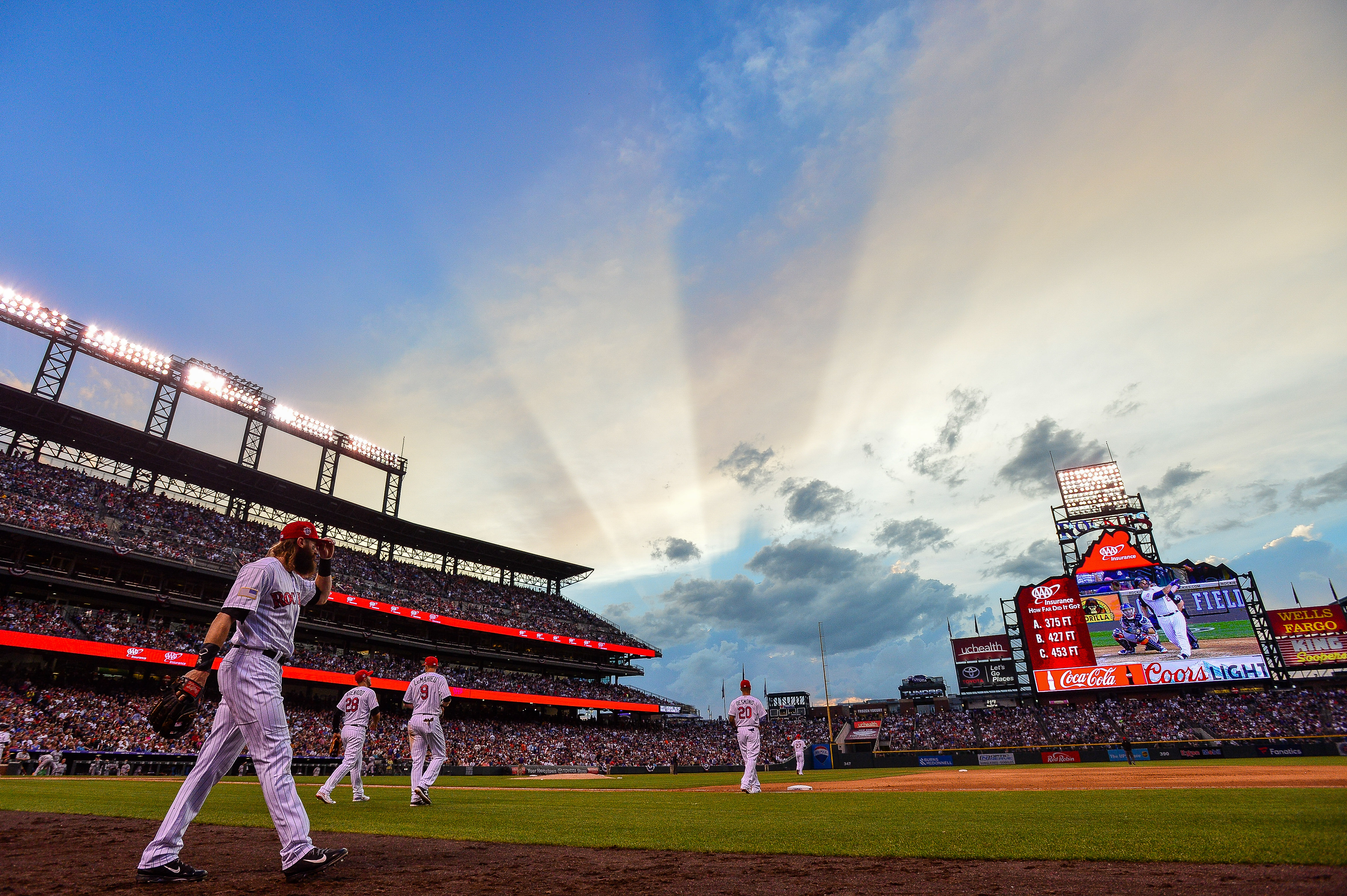
“I’m troubled as a Christian by the whole, ‘I prayed and my batting average went up five points’ kind of thing,” says Shaun Casey, Director of Georgetown University’s Berkley Center for Religion, Peace and World Affairs and former U.S. State Department Special Representative. “There is a sense sometimes that Christianity gets marketed as a solution to all your life’s problems. I have a number of Muslim friends. I never picked up a whiff of, ‘Allah helps me in my field, Allah helps me in my hitting.’ I think there is a stream across American Christianity [of], ‘Yeah, Jesus helps my batting average.’ I just think that’s a bad version of what Christianity’s really about.”
MLB does, to its credit, try and cover as many bases (pun intended this time) as possible by sanctioning league-wide “Heritage Nights” celebrating Jewish, Hispanic, Asian, Native American, African-American and other cultural blocs that complement its recent PR blitz touting unprecedented diversity. For example, the San Francisco Giants’ annual Jewish Heritage Night occurs in partnership with Chabad SF and the Jewish Community Federation and is highlighted by a pregame parking-lot party and limited-edition merch, with partial ticket proceeds set aside for the city’s overall homeless population.
This scans as slightly divergent in scope and charitable intent from, say, the Kansas City Royals’ July 27 Faith and Family Night (the “and Family” addendum is often affixed to avoid appearances of faith-based exclusivity), which is sponsored by Hobby Lobby, the for-profit craft-store chain that adheres to Christian values and was a successful co-plaintiff in a Supreme Court case asserting its right to abstain from providing employees with compulsory contraceptive coverage. The Royals’ site advertises that “players and/or executives” will speechify during the event, which will take place after the game inside the team’s 37,000-plus-capacity stadium and close out with a performance from Christian-music superstar Matthew West.
For some, the idea that MLB offers any kind of level playing field in the pursuit of inclusive representation is hard to swallow, and underscores Zirin’s opinion that the league can’t have it both ways. “I think it is a false equivalency,” says Tom Krattenmaker, a USA Today columnist, author of Onward Christian Athletes and communications director at Yale Divinity School, of likening Heritage Nights to Family Nights. “They’re very different in terms of scale, but also in the degree to which the team is facilitating an evangelism experience. It’s a gray area. They’ll always be able to say nobody’s forced to listen.”
Krattenmaker draws parallels between the swelling evangelical footprint within MLB and evangelicals’ growing influence on societal mores, despite their relative minority status within the total Christian consortium. As recently as last year, the total number of Americans who identify as evangelical was at 15 percent, down eight percent from 2008. Yet in the 2016 presidential election, they accounted for more than a quarter of all votes cast in the nation. If evangelicals’ political motivation was to preserve a particular idyll of American life resistant to modern demographic shifts, MLB’s M.O. might be to sanctify itself as the now-and-forever Eden for pro-sports Puritans.
High assures that’s far from the truth, and that when Third Coast approaches individual organizations about Faith Nights, they often “deal with a lot of hard-headed people” skeptical of the promotion, a leeriness that abates, he says, “when they make half a million dollars.”
Rogers, the former Giants minor-league pitcher and present RBI Austin Advisory Board member, reiterates that MLB rosters represent “an incredibly diverse group of people as a whole.” Still, he recognizes that a conspicuous slice of star players wears its Christianity on its jersey sleeves, and furthermore that “it’s not only accepted but smiled upon to be a good, wholesome, baseball-playing Christian.”
As much as anything, it’s symptomatic of baseball’s prolonged existential crisis. Does the game — and its function as the engine of a multi-billion-dollar enterprise — risk demystifying its quaint, national-pastime appeal as a concession to modernity, or get lapped as it upholds a peculiarly devout status quo?
For now, Rogers places his bets on the latter. “There’s safety in [MLB] putting out that image, just like [how] in basketball, there’s safety in being kind of a bombastic personality,” he explains. “A lot more people who yearn for Mayberry still watch baseball. Baseball has to become more interesting. It needs people to shed a light on diversity in the game. It needs people to market the diversity in the game. Tell me why a guy like Mookie Betts, with a name like Mookie who’s an absolute stud, how can you not make that guy a household name? It basically does the work for you.”
In his estimation, the disconnect between MLB and millions of would-be followers can be overcome with old-fashioned agnostic ballyhoo. “Twenty-five years ago, when I was idolizing Frank ‘The Big Hurt’ Thomas or Randy ‘The Big Unit’ [Johnson] or Nolan Ryan and The Ryan Express, these people were cartoon characters, larger than life,” he says. “The stories are there. The diversity is there. If you want to see baseball with a pulse, go to Latin America. And yet, here we are, playing it like gentlemen. That’s just the image we’ve created for baseball, and I think it’s a shame.”
The Charge will help you move better, think clearer and stay in the game longer. Subscribe to our wellness newsletter today.
